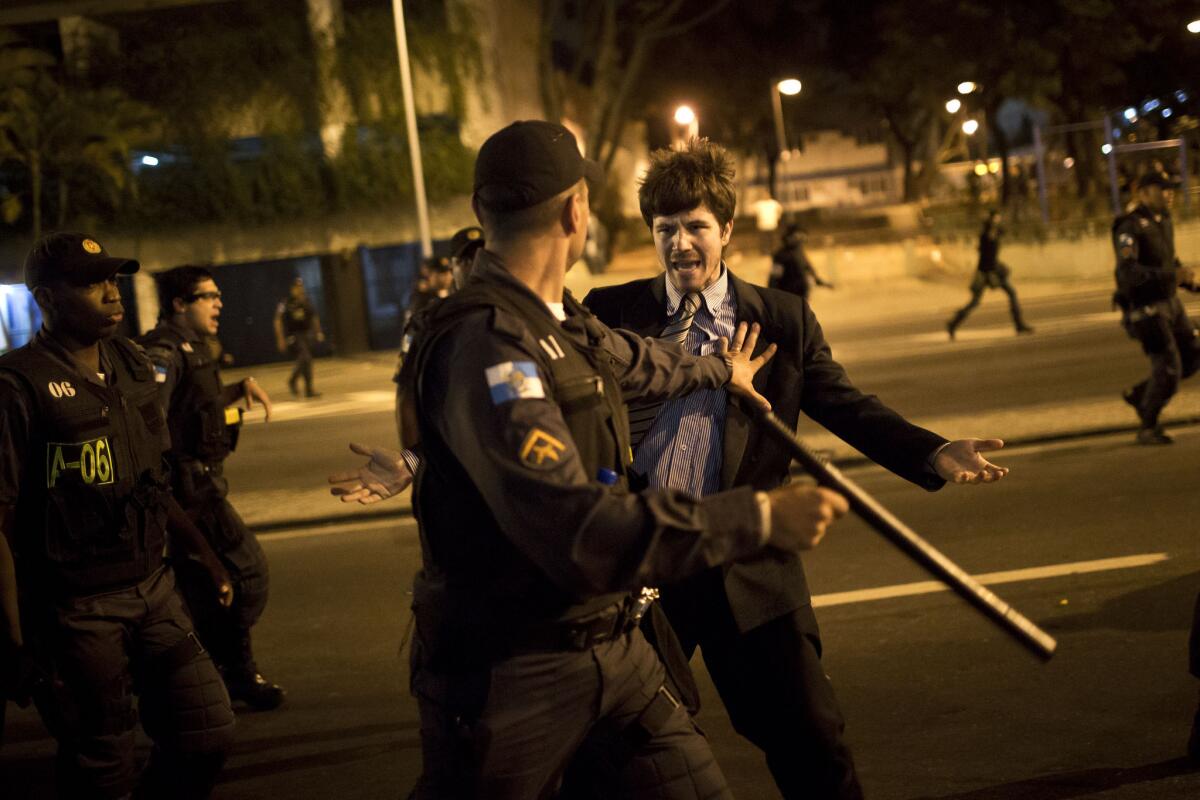Brazil’s Globo group apologizes for backing military government

- Share via
SAO PAULO, Brazil -- Globo, the media group that dominates Brazil’s market and has become a target of the widespread protests in the country, has apologized for supporting the military dictatorship that took over almost 50 years ago.
The editorial published in Saturday’s edition of Globo’s Rio de Janeiro-based newspaper took the country by surprise and leading some in rival outlets to wonder what Latin America’s largest media group had accomplished with the move. It may do little to win over protesters who view Globo as a much too powerful defender of the Brazilian elite’s conservative values.
“The truth is tough. Globo supported the dictatorship,” the editorial said. “The wave of protests on the streets ... gave us even more certainty in our internal evaluation that it was necessary to recognize this error.”
The mea culpa seemed well-timed. Hundreds of protesters taking part in an event Friday called the Grand Action Against Media Monopoly stormed Globo’s Sao Paulo offices, with some hurling excrement onto its walls.
Globo and most other major news media supported Brazil’s 1964 military coup, which was backed by the United States and served as a template for many other military takeovers in Latin America. Brazil’s military government, which ruled for more than 20 years, is being investigated by a truth commission for alleged torture and the disappearance of perceived enemies of the government.
But for protesters on the streets over the last few months who have directed their anger at Globo, the group’s more relevant failings lie in the present. Globo is the most visible and powerful of a small group of dominant media companies – almost all still controlled by the same elite families that supported the 1964 coup – that many protesters associate with the status quo.
“Globo has always been intertwined with the interests of a small minority. In general, a minority that has always been in power,” says Lara Schneider, 39, a teacher in Sao Paulo state who has been active in the protests and says that Globo’s apology will do little. “I don’t see it as something honest at all. It just looks like a banal marketing strategy.”
Along with the political class, Brazil’s largely conservative media have been swept into the spotlight by the protests, which began in early June, initially over a small bus fare hike but then spreading across the country and earning widespread public support after expanding to include issues such as corruption and poor public services in the severely economically divided country.
According to the Forbes Brazil billionaires list published last month, the three brothers in the Marinho family, which controls Globo, are worth a combined $21 billion – far more than any other Brazilian individual.
In response to what they see as hostile or untrustworthy major media, some protest groups have created their own media outlets, broadcasting live from the streets via smartphones and laptops with surprising success.
Other members of the media responded with confusion to Globo’s apology, which seemed to devote much more space to defending its legacy than to apologizing.
“Over and over, the newspaper tries to absolve itself of its own responsibility,” wrote Marcelo Semer in a column on the popular Terra web portal. “They justify themselves by using, today, the same thesis that the military used at the time: the absurd conception that the coup was meant to protect democracy.”
The Globo editorial said the support for the coup occurred in the context of the Cold War, and was “sharpened and deepened by the radicalization of Joao Goulart,” the president who was overthrown. Words of praise were directed at Roberto Marinho, father of the billionaire brothers.
“Roberto Marinho was always on the side of legality,” it said.
In an article published Monday in Carta Capital, Brazil’s only major left-leaning publication, which generally opposes Globo, Pedro Ekman wrote that Globo was only responding to pressure from the streets.
“Enough monopoly! We want more diversity! The people have a right to freedom of expression,” he wrote. “It must be recognized that [TV network] Rede Globo received numerous benefits in exchange for its support for the dictatorship ... which allowed Globo to become one of the world’s largest communications conglomerates.”
Globo posted its apology in the “Errors” section of its website, which includes, among other things, an apology for heavily editing a 1989 televised presidential debate in favor of conservative candidate Fernando Collor, who went on to defeat Luiz Inacio Lula da Silva before being impeached on charges of corruption. The episode became the focus of a 1993 BBC documentary titled “Beyond Citizen Kane,” which focused on Globo’s power in Brazil.
Days before the film was to premiere in Rio de Janeiro, military police confiscated the copies of the movie and it was not shown.
ALSO:
Mexican border city gripped by tale of black-clad avenger
Snowden contacted Russia while in Hong Kong, Putin says
Charges recommended against 30 alleged Auschwitz guards
Bevins is a special correspondent.
More to Read
Sign up for Essential California
The most important California stories and recommendations in your inbox every morning.
You may occasionally receive promotional content from the Los Angeles Times.










